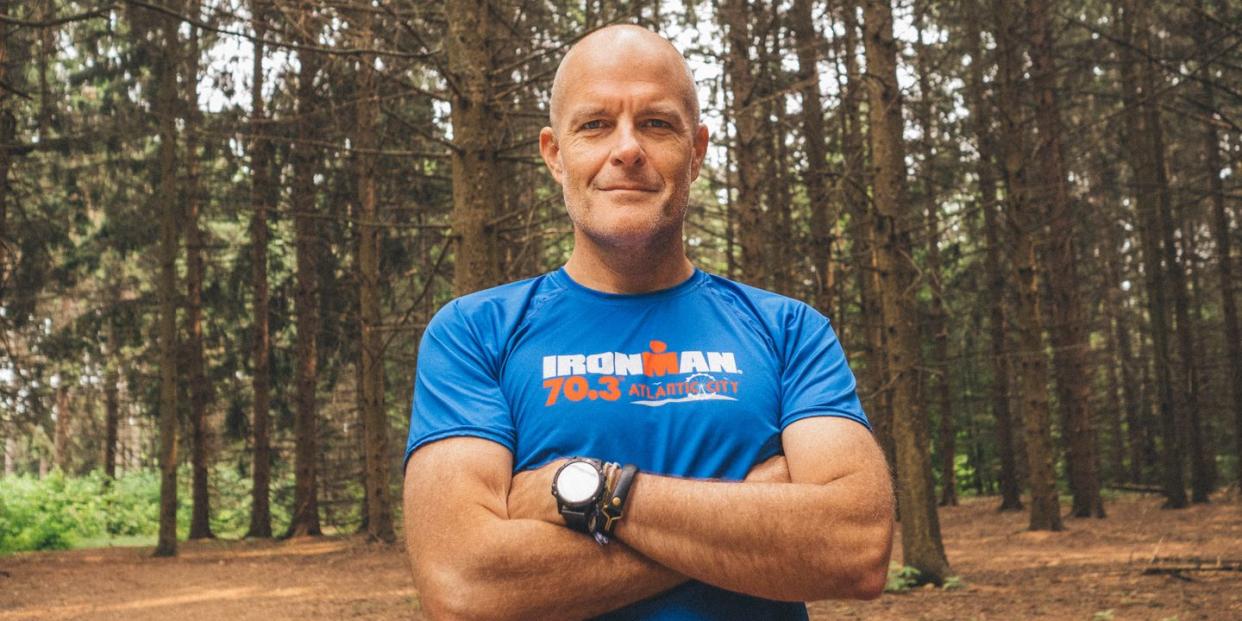Watching Kona on TV Helped This Music Exec Get Sober. Now, He’s Racing It Himself

The Kona Ironman World Championships came into Michael McDonald’s life about 25 years ago, when he was struggling with an alcohol and cocaine addiction. He was on the couch watching TV when the race caught his attention.
“Fate, luck, grace—whatever you want to call it—put me on the couch, hungover, watching that Ironman two years in a row,” McDonald, now 50, told Runner’s World.
He said he wasn’t feeling great about himself at the time, and when he saw the pro athletes and civilians finishing the 2.4-mile swim, 112-mile bike ride, and a marathon distance (26.2-mile) run, he wept. He was envious that the athletes were passionate about something that he couldn’t even fathom doing.
After watching the race two years in a row, McDonald—who founded Mick Management, a Brooklyn-based music management company—was inspired to get sober and healthy again.
To conquer his addiction, he got involved with MusiCares, a nonprofit organization that helps those in the music industry who are struggling with substance abuse and addiction, hunger, and financial strain. (He is now chairman emeritus of the organization.)
Today, the New York City resident is celebrating being sober for 20 years, which he credits to the programs at MusiCares as well one unexpected outlet that helped his journey to sobriety: cycling.
Replacing his old, bad habits with a bike, McDonald found himself searching for more opportunities to ride. He completed a 250-mile trek from New York City to Boston in his early years of sobriety. Then it hit him: He knew how to ride a bike and he knew how to run. If he figured out how to swim, that race he saw years before could be within reach.
So 13 years ago, he impulsively signed up for the Steelhead Half Ironman with his sister in his hometown of Benton Harbor, Michigan, leaving just a few months to train for the triathlon. Relying on training plans the siblings found online, they motivated each other to prepare for the grueling test. On the day of the race, he not only finished the 140.6-mile triathlon—he also fell in love with it.
“When I finished I thought, ‘I’ve found my thing.’ I was a casual athlete growing up, but even though I felt like I was a late bloomer, this was going to be my sport,” McDonald said.
It was not Kona, but it was the first step toward McDonald doing it.
That first taste of the Ironman distance led him to getting really fit—through regular cycling, running, and swimming workouts, plus weightlifting—and inspired him to complete several Half Ironman (70.3-mile) races since that first full one. Along with physical fitness gains, he also saw improvements with his mental strength.
“I think the connection with the outdoors and fitness—and more specifically endurance work and mental health—can’t be overstated,” said McDonald.
His journey to becoming an Ironman athlete wasn’t all smooth sailing, though. After the birth of his three daughters, McDonald’s window for working out became smaller and smaller, until about two years ago, when he decided to jump back in to training hard. His 50th birthday and his 20th year of sobriety were coming up in 2019. With the stars seemingly aligning, he knew it was time to chase his Kona dream.
“There was too much going on to celebrate, I figured [2019] is the perfect year to do it,” said McDonald, who registered for Kona as a charity participant. He started working with a coach to prepare for the race on Saturday, October 12, and also began fundraising for MusiCares. Training involved doing interval work on a cycling trainer four days a week, plus swimming and running workouts. On weekends, he did longer swims, rides, and runs
[Want to fly up hills?Climb! gives you the workouts and mental strategies to conquer your nearest peak.]
He said that his strongest leg of the race will be the cycling portion, but the biggest area he has improved on through training is his mindset.
In the race, his goal is to avoid thinking, “I have to run another five miles, I have to do 20 miles more on this ride.” Instead, he wants to frame his thinking as, “This is what I get to do, this is what my sobriety and body has enabled me to do,” he said.
Training for Kona has not only bettered himself, but it has also allowed McDonald to support the organization that helped turn his life around. So far, he’s raised nearly $400,000 on CrowdRise for MusiCares.
“They were there for me when I got sober 20 years ago. I attended free group therapy for the first two years I was sober,” he said. “The group saved my life.”
MusiCares is the reason that 25 years after watching the race as an addict, McDonald will take on the race he never thought he could do himself.
“To actually do it is extremely fulfilling—to go from couch to the Kona finish line is, to me, a storybook ending,” he said. “Hopefully there is someone on the couch this year watching and saying, ‘I could never do that that,’ who will be inspired. I hope I can help someone else turn their life around.”
You Might Also Like

